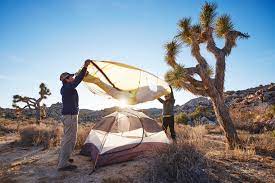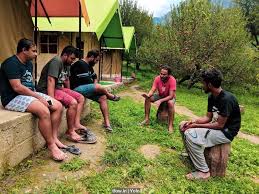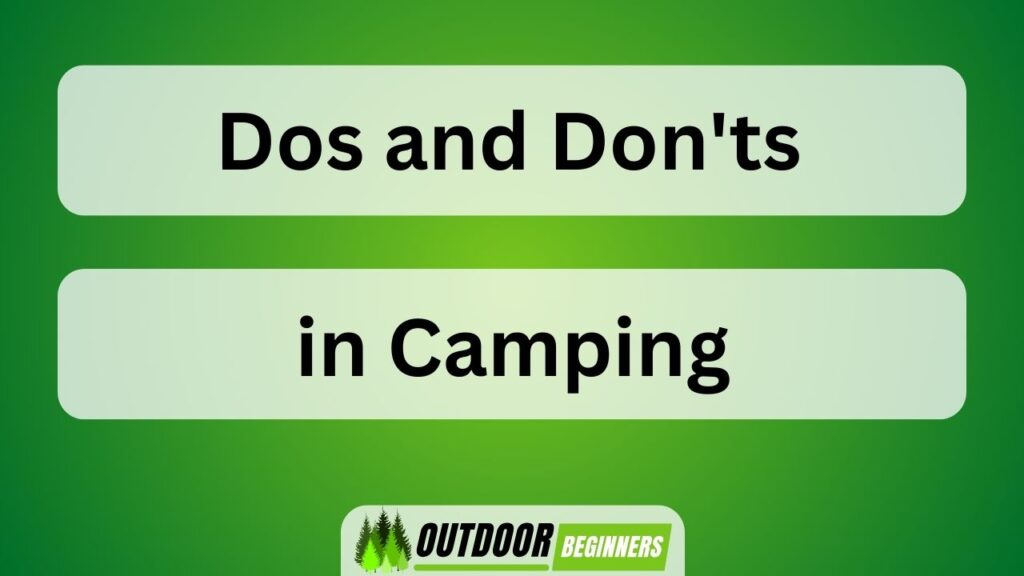Camping is a popular outdoor activity that requires careful planning, adherence to certain guidelines, and responsible behavior.
This article aims to provide a comprehensive overview of the dos and don’ts in camping, offering practical advice for individuals interested in embarking on such trips.

By following these recommendations, campers can ensure their safety, minimize negative environmental impact, and enhance their overall experience.
From preparing for the trip to practicing Leave No Trace principles while camping, this article covers various aspects necessary for a successful camping excursion.
Key Takeaways of Dos and Don’ts in Camping
- Create a camping checklist and engage in meal planning
- Choose a suitable location for your campsite and position the tent on flat ground
- Select a safe location for the campfire and properly extinguish it before leaving
- Stay on designated trails, respect wildlife, and adhere to leave no trace principles to minimize impact on nature
Preparing for Your Camping Trip
One crucial aspect of camping is adequately preparing for the trip to ensure a smooth experience. To do this, it is important to create a camping checklist and engage in meal planning.
A camping checklist helps in organizing and packing all the necessary equipment and supplies needed for the trip. It includes items such as tents, sleeping bags, cooking utensils, first aid kits, and clothing suitable for the weather conditions. This ensures that nothing essential is forgotten and reduces any potential frustrations during the trip.

Additionally, meal planning involves deciding on menus, purchasing groceries in advance, and considering dietary restrictions or preferences of all campers. By planning meals ahead of time, unnecessary stress can be avoided while ensuring everyone’s nutritional needs are met during the camping trip.
Transitioning into setting up your campsite…
Setting Up Your Campsite
When setting up a campsite, it is important to carefully choose a suitable location and arrange the necessary equipment in an organized manner. A well-planned campsite layout can contribute to a comfortable and enjoyable camping experience.

The first step in setting up your campsite is to select an appropriate location that offers both safety and convenience. Look for level ground away from potential hazards such as dead trees or rocky areas.
Once the site is chosen, consider the placement of your tent. Ensure that it is positioned on flat ground, avoiding low-lying areas where rainwater could accumulate. Additionally, orient your tent door away from prevailing winds to minimize drafts and potential damage.
Lastly, arrange other equipment like cooking utensils, food storage containers, and chairs in an orderly manner around the campsite for easy accessibility during your stay.
Campfire Safety and Etiquette
Campfire safety and etiquette are important aspects to consider when enjoying the outdoors. Ensuring campfire safety is crucial to prevent accidents and wildfires. It is essential to select a safe location for the campfire, away from flammable materials such as dry leaves or overhanging branches. Clearing an area around the fire pit of any debris can also help minimize the risk of sparks igniting nearby objects. Properly extinguishing the fire before leaving is essential, using water or soil and ensuring there are no remaining embers.

Additionally, practicing campfire etiquette involves being considerate of others by not creating excessive smoke or noise and respecting any local regulations regarding fires. By following these guidelines, campers can enjoy their outdoor experience while minimizing their impact on the environment.
To ensure a successful camping trip, choosing the right gear and equipment is crucial.
Choosing the Right Gear and Equipment
When it comes to camping, having the right gear and equipment is essential for a successful and enjoyable experience. There are certain essentials that every camper should have, including a tent, sleeping bag, camping stove, and appropriate clothing.
However, there are also common mistakes that inexperienced campers often make when it comes to their gear selection or usage, which can lead to discomfort or even safety hazards in the wilderness.
Gear Essentials for Camping
One key component of a successful camping trip is ensuring that you have all the necessary gear essentials. To help you prepare, here are three important items to include on your camping checklist:
- Tent: A good quality tent is crucial for providing shelter and protection from the elements. Consider factors such as size, weight, durability, and ease of setup when choosing a tent.
- Sleeping bag: A comfortable sleeping bag will keep you warm and cozy throughout the night. Look for one that suits the climate conditions of your camping destination and provides adequate insulation.
- Cooking equipment: Having the right cooking gear is essential for preparing meals in the great outdoors. This can include a portable stove, cookware, utensils, and a cooler to store perishable food items.
When selecting your gear essentials, it can be helpful to consult camping gear reviews to ensure you make informed choices based on other campers’ experiences.
Common Equipment Mistakes
Proper gear selection is crucial for a successful camping trip. However, even experienced campers can make common equipment mistakes that can impact their overall experience.
One of the most common mistakes is not considering the weather conditions and terrain when selecting gear. For example, using a lightweight tent designed for warm weather in a cold and windy environment can lead to discomfort and even hypothermia.
Another mistake is failing to properly maintain and repair equipment before heading out on a camping trip. This includes checking for any damages or malfunctions in tents, sleeping bags, backpacks, stoves, and other essential items. Neglecting this step can result in unexpected failures during the trip.
Additionally, overpacking or underpacking can also be problematic – carrying too much weight can be exhausting while having insufficient supplies can compromise safety and comfort.
To avoid these mistakes, it’s important to carefully research and select gear suitable for the specific camping conditions, regularly inspect equipment for damages or wear, and pack thoughtfully with consideration to anticipated needs during the trip.
Exploring and Enjoying Nature Responsibly
To ensure the preservation of natural habitats, it is important to explore and enjoy nature responsibly while camping. Responsible hiking and wildlife conservation are key aspects of this responsible exploration.
Here are three guidelines to help campers engage with nature in a responsible manner:
- Stay on designated trails: By sticking to established paths, campers can minimize their impact on fragile ecosystems and protect sensitive vegetation from trampling.
- Respect wildlife: Campers should maintain a safe distance from animals encountered during hikes, avoiding any actions that could disturb or harm them. Feeding wildlife should be strictly avoided as it disrupts their natural behavior and diet.
- Leave no trace: It is crucial to leave the environment as undisturbed as possible by properly disposing of waste, minimizing noise pollution, and refraining from taking home natural souvenirs.
Leave No Trace Principles While Camping
In order to minimize the impact on the environment, it is essential to adhere to leave no trace principles while camping. These principles aim to promote responsible camping practices and ensure that natural areas are preserved for future generations.
The first principle is to plan ahead and prepare, which involves familiarizing oneself with the area’s regulations and potential environmental challenges.
Secondly, campers should strive to travel and camp on durable surfaces, such as established trails or designated campsites, in order to prevent unnecessary damage to sensitive ecosystems.
Additionally, minimizing campfire impacts by using established fire rings or stoves helps prevent wildfires and reduces air pollution.
Proper disposal of waste is another crucial aspect of responsible camping; all trash should be packed out and human waste disposed of properly following designated guidelines.
Lastly, respecting wildlife by observing from a distance and not feeding them contributes to their wellbeing and maintains their natural behaviors.
Frequently Asked Questions
What Are Some Common Camping Mistakes to Avoid?
Common camping mistakes can be avoided by following proper camping etiquette. Some common mistakes include leaving trash behind, being loud and disruptive to other campers, not respecting wildlife and nature, and not properly extinguishing fires.
How Do I Choose the Best Campsite for My Camping Trip?
Campsite selection is crucial for a successful camping trip. Factors such as proximity to water sources, level ground, and shelter from wind should be considered. Conducting thorough research and consulting experienced campers can aid in choosing the best campsite.
Are There Any Specific Regulations or Restrictions Regarding Campfires at Certain Campsites?
Campfire regulations and restrictions vary among campsites. Some may have designated fire pits while others prohibit fires altogether. It is advisable to check with the campground authorities or research online beforehand to ensure compliance with the specific rules in place.
What Are Some Essential Items to Pack for a Camping Trip?
When preparing for a camping trip, it is essential to pack necessary camping gear such as a tent, sleeping bag, cooking equipment, and appropriate clothing. Additionally, planning camping food ideas will ensure a satisfying and enjoyable experience.
How Can I Minimize My Impact on the Environment While Camping?
Minimizing environmental impact while camping involves adopting eco-friendly practices and adhering to the Leave No Trace principles. These techniques aim to preserve natural resources, minimize waste generation, and promote responsible outdoor recreation.
Conclusion
In conclusion, it is essential to follow the dos and don’ts of camping to ensure a successful and enjoyable trip. By adhering to proper preparation techniques, such as packing appropriate gear and equipment, one can enhance their overall camping experience.
Additionally, setting up a campsite responsibly and practicing campfire safety not only protects the environment but also ensures the safety of oneself and others.
Lastly, exploring nature with respect for its beauty and following leave no trace principles allows for a sustainable camping experience.
Remember, knowledge, experience, and practicality are key when embarking on any camping adventure.




